Unit 3 Getting along with others Grammar and usage限制性关系从句 课件
文档属性
| 名称 | Unit 3 Getting along with others Grammar and usage限制性关系从句 课件 | 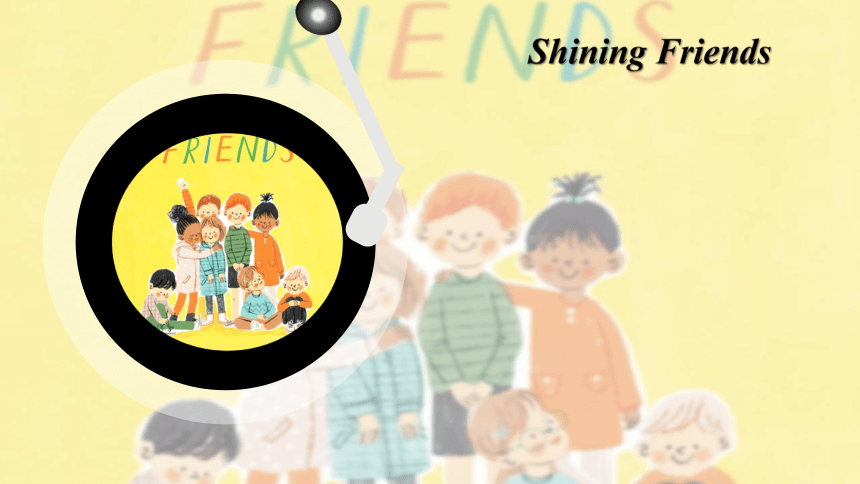 | |
| 格式 | pptx | ||
| 文件大小 | 12.8MB | ||
| 资源类型 | 试卷 | ||
| 版本资源 | 牛津译林版(2019) | ||
| 科目 | 英语 | ||
| 更新时间 | 2024-06-05 09:03:21 | ||
图片预览

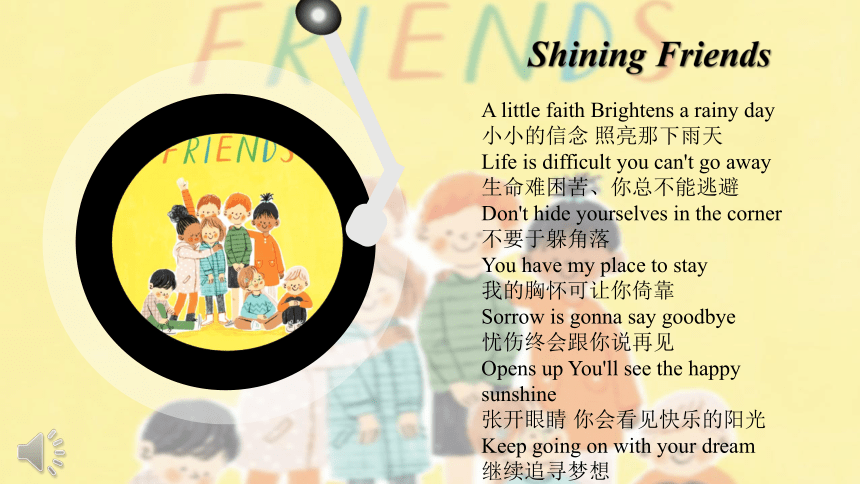

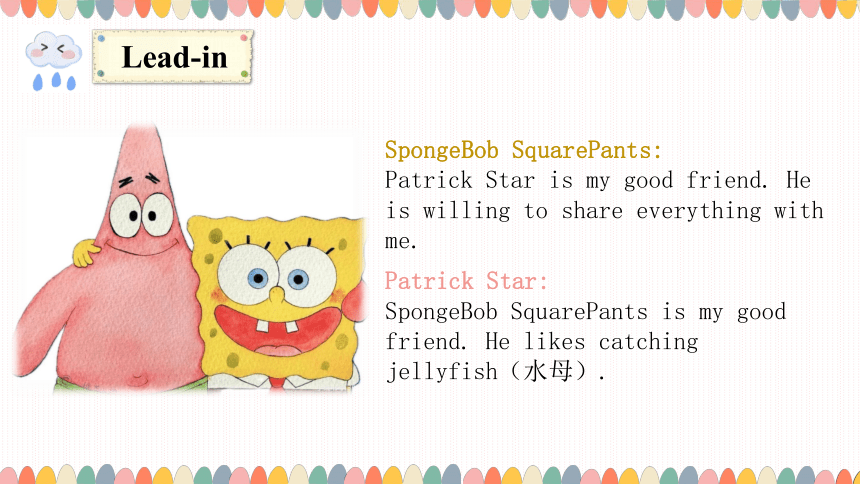
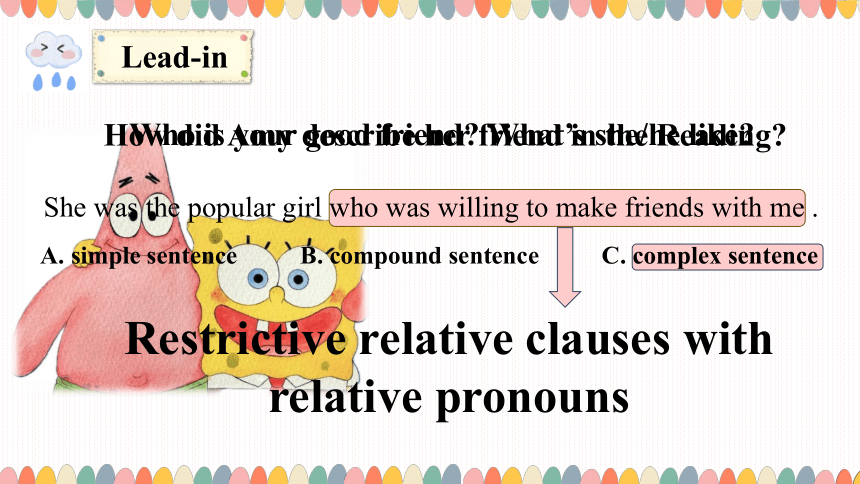
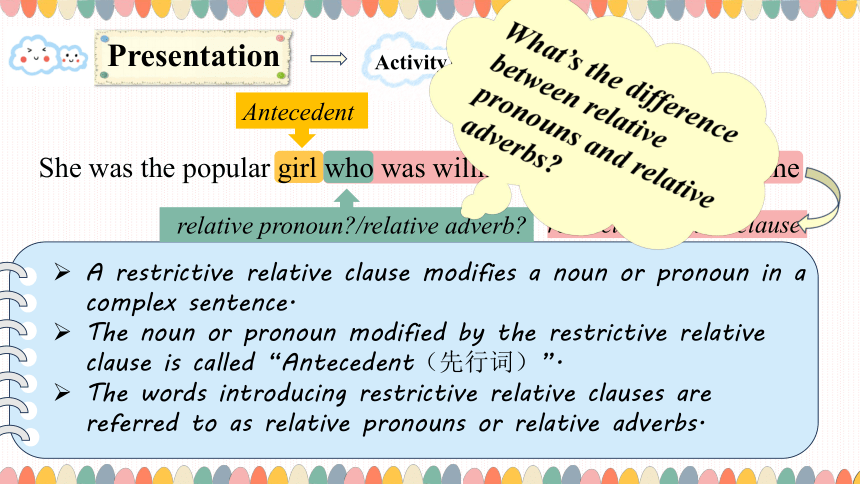

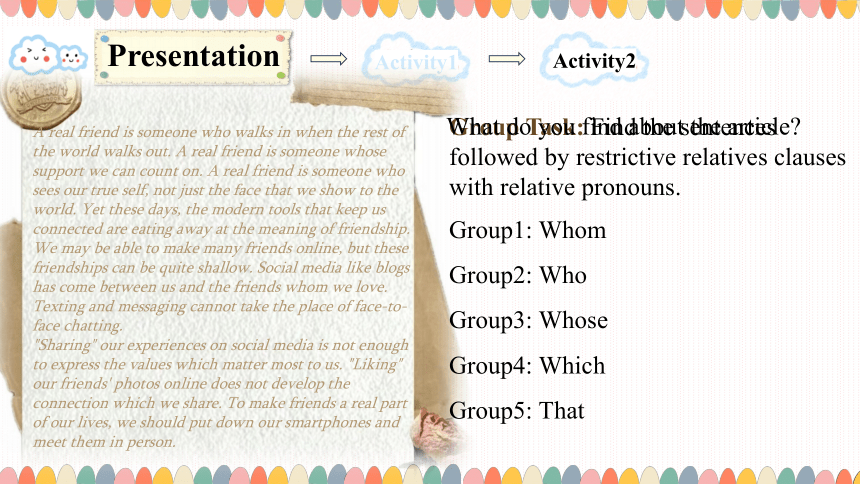
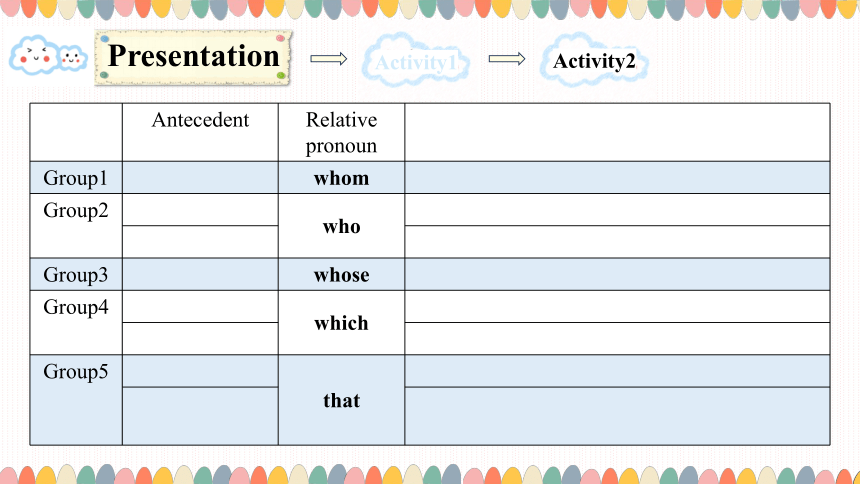
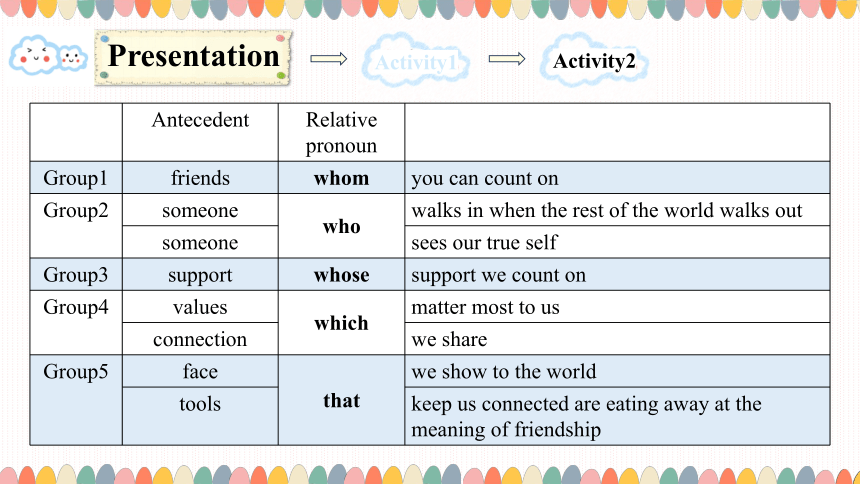
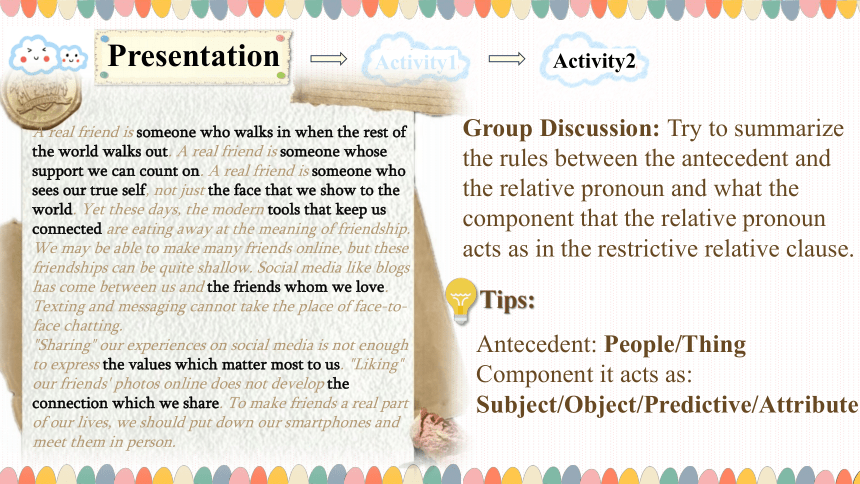

文档简介
(共33张PPT)
Shining Friends
Shining Friends
A little faith Brightens a rainy day
小小的信念 照亮那下雨天
Life is difficult you can't go away
生命难困苦、你总不能逃避
Don't hide yourselves in the corner
不要于躲角落
You have my place to stay
我的胸怀可让你倚靠
Sorrow is gonna say goodbye
忧伤终会跟你说再见
Opens up You'll see the happy sunshine
张开眼睛 你会看见快乐的阳光
Keep going on with your dream
继续追寻梦想
Chasing tomorrow's sunrise
向着明天的太阳追赶
The spirit can never die
不会逝去的、是信念与理想
Sun will shine, my friend
好朋友、太阳会闪耀
Won't let you cry, my dear
谁都不会令你流泪
Seeing you shed a tear Make my world disappear
你的一滴眼泪 都会让我的世界灰暗
You'll never be alone in darkness
在黑暗中、你永不会孤独
See my smile, my friend
好朋友、看我的笑颜
We are with you, holding hands
手牵手、我们和你一起走
you have got to believe, you are my destiny
在我宁静的心灵、你是我的信念与目标
We're meant to be your friends
我们永远都会在一起
That's what a friendship should be
因为我们是朋友
Unit 3 Getting along with others
Restrictive relative clauses with relative pronouns
Grammar and usage
Lead-in
SpongeBob SquarePants:
Patrick Star is my good friend. He is willing to share everything with me.
Patrick Star:
SpongeBob SquarePants is my good friend. He likes catching jellyfish(水母).
Lead-in
Who is your good friend What’s she/he like
How did Amy describe her friend in the Reading
She was the popular girl who was willing to make friends with me .
A. simple sentence B. compound sentence C. complex sentence
Restrictive relative clauses with relative pronouns
Presentation
Activity1
A restrictive relative clause modifies a noun or pronoun in a complex sentence.
The noun or pronoun modified by the restrictive relative clause is called “Antecedent(先行词)”.
The words introducing restrictive relative clauses are referred to as relative pronouns or relative adverbs.
She was the popular girl who was willing to make friends with me .
restrictive relative clause
Antecedent
relative pronoun /relative adverb
What’s the difference between relative pronouns and relative adverbs
Presentation
Activity1
The words introducing restrictive relative clauses are referred to as relative pronouns or relative adverbs.
relative pronouns: act as subject, object, predicate or attribute in the subordinate clauses.
The words introducing restrictive relative clauses are referred to as relative pronouns or relative adverbs.
She was the popular girl who was willing to make friends with me .
restrictive relative clause
Antecedent
relative pronoun /relative adverb
relative pronouns: act as subject, object, predictive or attribute in the restrictive relative clauses.
This is the house which I live in.
relative adverbs: cannot act as the main component in the restrictive relative clauses.
This is the house where I live.
whom who whose which that
Presentation
Activity1
Activity2
A real friend is someone who walks in when the rest of the world walks out. A real friend is someone whose support we can count on. A real friend is someone who sees our true self, not just the face that we show to the world. Yet these days, the modern tools that keep us connected are eating away at the meaning of friendship.
We may be able to make many friends online, but these friendships can be quite shallow. Social media like blogs has come between us and the friends whom we love. Texting and messaging cannot take the place of face-to-face chatting.
"Sharing" our experiences on social media is not enough to express the values which matter most to us. "Liking" our friends' photos online does not develop the connection which we share. To make friends a real part of our lives, we should put down our smartphones and meet them in person.
Group Task: Find the sentences followed by restrictive relatives clauses with relative pronouns.
Group1: Whom
Group2: Who
Group3: Whose
Group4: Which
Group5: That
What do you find about the article
Presentation
Activity1
Activity2
Antecedent Relative pronoun
Group1 whom
Group2 who
Group3 whose
Group4 which
Group5 that
Presentation
Activity1
Activity2
Antecedent Relative pronoun
Group1 friends whom you can count on
Group2 someone who walks in when the rest of the world walks out
someone sees our true self
Group3 support whose support we count on
Group4 values which matter most to us
connection we share
Group5 face that we show to the world
tools keep us connected are eating away at the meaning of friendship
Presentation
Activity1
Activity2
A real friend is someone who walks in when the rest of the world walks out. A real friend is someone whose support we can count on. A real friend is someone who sees our true self, not just the face that we show to the world. Yet these days, the modern tools that keep us connected are eating away at the meaning of friendship.
We may be able to make many friends online, but these friendships can be quite shallow. Social media like blogs has come between us and the friends whom we love. Texting and messaging cannot take the place of face-to-face chatting.
"Sharing" our experiences on social media is not enough to express the values which matter most to us. "Liking" our friends' photos online does not develop the connection which we share. To make friends a real part of our lives, we should put down our smartphones and meet them in person.
Group Discussion: Try to summarize the rules between the antecedent and the relative pronoun and what the component that the relative pronoun acts as in the restrictive relative clause.
Antecedent: People/Thing
Component it acts as: Subject/Object/Predictive/Attribute
Tips:
Presentation
Activity1
Activity2
Antecedent Relative pronoun
Group1 friends whom we love
Group2 someone who walks in when the rest of the world walks out
someone sees our true self
Group3 support whose support we count on
Group4 values which matter most to us
connection we share
Group5 face that we show to the world
tools keep us connected are eating away at the meaning of friendship
Presentation
Activity1
c
Activity2
c
Activity3
Whom
When the antecedent refers to people and it acts as object in the restrictive relative clause, we use the relative pronoun——whom.
A relationship with a true friend whom you can count on will surely produce fruit.
When whom is the object of a preposition, the preposition can be placed before whom.
Social media like blogs has come between us and the friends whom we love.
Presentation
Activity1
c
Activity2
c
Activity3
Whom
When the antecedent refers to people and it acts as object in the restrictive relative clause, we use the relative pronoun——whom.
A relationship with a true friend whom you can count on will surely produce fruit.
When whom is the object of a preposition, the preposition can be placed before whom.
A relationship with a true friend on whom you can count will surely produce fruit.
Presentation
Activity1
c
Activity2
c
Activity3
Who
When the antecedent refers to people and it acts as subject、 or object in the restrictive relative clause, we use the relative pronoun——who.
A real friend is someone who walks in when the rest of the world walks out.
A real friend is someone who sees our true self.
Subject
Presentation
Activity1
c
Activity2
c
Activity3
Who
When the antecedent refers to people and it acts as subject、 object in the restrictive relative clause, we use the relative pronoun——who.
A relationship with a true friend who/whom you can count on will surely produce fruit.
Social media like blogs has come between us and the friends who/whom we love.
Object
Who/Whom
Presentation
Activity1
c
Activity2
c
Activity3
Whose
“Whose” acts as an attribute to show possession in the restrictive relative clause.
A real friend is someone whose support we count on.
Friendship grow best between friends whose communication is warm and open.
someone’s support
friends’ communication
Presentation
Activity1
c
Activity2
c
Activity3
Which
When the antecedent refers to thing and it acts as subject or object in the restrictive relative clause, we use the relative pronoun——which.
“Sharing” our experiences on social media is not enough to express the values which matter most to us.
Yet these days, the modern tools that keep us connected are eating away at the meaning of friendship.
Subject
Yet these days, the modern tools that/which keep us connected are eating away at the meaning of friendship.
Presentation
Activity1
c
Activity2
c
Activity3
Which
When the antecedent refers to thing and it acts as subject or object in the restrictive relative clause, we use the relative pronoun——which.
“Liking” our friends’ photos online does not develop the connection which we share.
A real friend is someone who sees our true self, not just the face that we show to the world.
Object
A real friend is someone who sees our true self, not just the face that/which we show to the world.
Presentation
Activity1
c
Activity2
c
Activity3
That
When the antecedent refers to people、thing or people+thing and acts as subject、object or predictive in the restrictive relative clause, we use the relative pronoun——that.
When “that” acts as the object, it can be omitted.
“Liking” our friends’ photos online does not develop the connection that/which we share.
A real friend is someone who sees our true self, not just the face that/which we show to the world.
“Liking” our friends’ photos online does not develop the connection we share.
A real friend is someone who sees our true self, not just the face we show to the world.
Presentation
Activity1
c
Activity2
c
Activity3
That
When the antecedent refers to people、thing or people+thing and acts as subject、object or predictive in the restrictive relative clause, we use the relative pronoun——that.
Subject Object Predictive Attribute
People
Thing
Who/That
Which/That
Who/Whom/That/不填
Which/That/不填
That/不填
That/不填
Whose
Presentation
Activity1
c
Activity2
c
Activity3
That Which/Who×
Only “that” can be used:
When the antecedent is an indefinite pronoun such as all, everything, nothing, anything, little, much, etc., or when the antecedent is modified by these words.
When the antecedent is an ordinal, an adjective superlative, or when the antecedent is modified by an ordinal or an adjective superlative.
When the antecedent is modified by the only, the very, the last.
Beauty is truth, truth beauty,——that is all (that) you know on earth, and all (that) you need to know.
Yang Liwei is the first Chinese man that travelled the space successfully.
The only that is worth living is one your are really passionate about.
Presentation
Activity1
c
Activity2
c
Activity3
That Which/Who×
Only “that” can be used:
When the antecedent is an indefinite pronoun such as all, everything, nothing, anything, little, much, etc., or when the antecedent is modified by these words.
When the antecedent is an ordinal, an adjective superlative, or when the antecedent is modified by an ordinal or an adjective superlative.
When the antecedent is modified by the only, the very, the last.
When the main sentence is a question beginning with who or which, use that to avoid repetition.
Who was the first Chinese that travelled the space successfully
Presentation
Activity1
c
Activity2
c
Activity3
Who That×
Only “who” can be used:
When the antecedent is an indefinite pronoun referring to a person, such as one、 ones、 anyone or someone.
When the antecedent is those referring to people.
In the sentence pattern——there be.
When the antecedent has a long post attribute.
You are the one who can understand me.
Never let those who carry firewood for us die of cold.
There is a gentleman who is waiting for you.
Do you know the man with black thick glasses who is speaking at the meeting
Presentation
Activity1
c
Activity2
c
Activity3
Which That×
Only “who” can be used:
When the antecedent is that or those.
When a preposition comes before a relative pronoun.
You must find those which may be ignored by us.
The building in which my brother works is very old.
A real friend is someone _________ walks in when the rest of the world walks out.
A real friend is someone _________ sees our true self, not just the face _________ we show to the world.
A real friend is someone _________ support we can count on.
Yet these days, the modern tools _________ keep us connected are eating away at the meaning of friendship.
Social media like blogs has come between us and the friends _________ we love.
"Sharing" our experiences on social media is not enough to express the values _________ matter most to us.
"Liking" our friends' photos online does not develop the connection _________ we share.
Practice
Task1
Task1: Choose all the correct answer.
D. which
E. that
F. /
A. whom
B. who
C. whose
B. who
B. who
D E F
C. whose
D E
A B E F
D E
D E F
Practice
Task1
Task2: Rewrite the following sentences using restrictive relative clauses.
Task2
Common interests provide rich ground. Many friendships grow from rich ground.
Common interests provide rich ground__________________________________.
When friends' communication is warm and open. Friendships grow best.
Friendships grow best between friends__________________________________.
Friendships are like flowers. These flowers need to be taken good care of.
Friendships are like flowers____________________________________.
A relationship with a true friend will surely produce fruit. You can count on a true friend.
A relationship with a true friend___________________________ will surely produce fruit.
You have been helped by others. To make friends, you should help others in the same way.
To make friends, you should help others the way_________________________________.
from which many friendships grow
whose communication is warm and open
which/that need to be taken good care of
(who/whom/that)you can count on
When the antecedent is “way” and acts as an adverbial in the restrictive relative clauses.
You should help others in the way you have been helped.
You should help others the way _______ you have been helped.
in which
You should help others the way _______ you have been helped.
that
You should help others the way you have been helped.
(in which/that)you have been helped
Practice
Task1
Task2: Rewrite the following sentences using restrictive relative clauses.
Task2
Common interests provide rich ground. Many friendships grow from rich ground.
Common interests provide rich ground__________________________________.
When friends' communication is warm and open. Friendships grow best.
Friendships grow best between friends__________________________________.
Friendships are like flowers. These flowers need to be taken good care of.
Friendships are like flowers____________________________________.
A relationship with a true friend will surely produce fruit. You can count on a true friend.
A relationship with a true friend___________________________ will surely produce fruit.
You have been helped by others. To make friends, you should help others in the same way.
To make friends, you should help others the way_________________________________.
from which many friendships grow
whose communication is warm and open
which/that need to be taken good care of
(who/whom/that)you can count on
When the antecedent is “way” and acts as subject or object in the restrictive relative clauses.
You shouldn’t speak to her in the way which/that annoys her.
You speak to her in the way (which/that) I dislike.
(in which/that)you have been helped
Production
Give a short introduction to your best friend.
Hello, everyone! Today, I want to introduce my bestie(闺蜜) to you. Her name is Lily who is the same age as me.
She has a unique taste in food. She loves stinky Tofu(臭豆腐) and River snails rice noodle(螺蛳粉) which are unacceptable to lots of people, including me. Although I don’t share her love for these foods, we still often eat together. And we have the same interest in books that is related to history.
She is also a good helper and listener who’s always there for me. We build our friendship on mutual respect and understanding. I believe our friendship will endure forever.
Introduce who’s your best friend
Her/His hobby、favorite food、character、appearance、first impression…
Understanding of friendship、expectation for future、gratitude for her/his help
Production
Give a short introduction to your best friend.
Introduce who’s your best friend
Her/His hobby、favorite food、character、appearance、first impression…
Understanding of friendship、expectation for future、gratitude for her/his help
Bestie(闺蜜)Ride or die(死党)Meal buddy(饭搭子)Childhood friend(发小)
Spicy hot pot(麻辣烫)Grilled fresh-squid(铁板鱿鱼)Chinese Crepes(煎饼果子)Chinese Hamburger(肉夹馍)Stinky tofu(臭豆腐)River snails rice noodle(螺蛳粉)
Introvert(i人)Extrovert(e人)
Gypsum doll(石膏娃娃)Amusement Park(游乐园)Sip tea(吃瓜)Art exhibition(艺术展览)
1. A single rose can be my garden… a single friend, my world.
“一枝玫瑰可以是我的小花园,而一个朋友,则是我的世界。”
2.In the cookie of life, friends are the chocolate chips.
朋友是生活曲奇上的巧克力豆。
Use at least three restrictive relative clauses
Shining Friends
Relative pronoun
Summary
Only “that” used
Only “who”
used
Relative adverb
“way” as antecedent
Only “which” used
Restrictive relative clause
The antecedent is or modified by an indefinite pronoun.
The antecedent is or modified by an ordinal, an adjective superlative.
When the antecedent is modified by the only, the very, the last.
When the main sentence is a question beginning with who or which.
The antecedent is an indefinite pronoun referring to a person.
The antecedent is those referring to people.
In the sentence pattern——there be.
The antecedent has a long post attribute.
The antecedent is that or those.
The When a preposition comes before the relative pronoun.
Act as an adverbial-in which/that/不填
Act as the object or sunject
Assignment
complete the 35-page B2 exercise section.
continue to complete the report introducing their best friend after class, and the four students in the group check each other for grammar mistakes and spelling mistakes.
Shining Friends
Shining Friends
A little faith Brightens a rainy day
小小的信念 照亮那下雨天
Life is difficult you can't go away
生命难困苦、你总不能逃避
Don't hide yourselves in the corner
不要于躲角落
You have my place to stay
我的胸怀可让你倚靠
Sorrow is gonna say goodbye
忧伤终会跟你说再见
Opens up You'll see the happy sunshine
张开眼睛 你会看见快乐的阳光
Keep going on with your dream
继续追寻梦想
Chasing tomorrow's sunrise
向着明天的太阳追赶
The spirit can never die
不会逝去的、是信念与理想
Sun will shine, my friend
好朋友、太阳会闪耀
Won't let you cry, my dear
谁都不会令你流泪
Seeing you shed a tear Make my world disappear
你的一滴眼泪 都会让我的世界灰暗
You'll never be alone in darkness
在黑暗中、你永不会孤独
See my smile, my friend
好朋友、看我的笑颜
We are with you, holding hands
手牵手、我们和你一起走
you have got to believe, you are my destiny
在我宁静的心灵、你是我的信念与目标
We're meant to be your friends
我们永远都会在一起
That's what a friendship should be
因为我们是朋友
Unit 3 Getting along with others
Restrictive relative clauses with relative pronouns
Grammar and usage
Lead-in
SpongeBob SquarePants:
Patrick Star is my good friend. He is willing to share everything with me.
Patrick Star:
SpongeBob SquarePants is my good friend. He likes catching jellyfish(水母).
Lead-in
Who is your good friend What’s she/he like
How did Amy describe her friend in the Reading
She was the popular girl who was willing to make friends with me .
A. simple sentence B. compound sentence C. complex sentence
Restrictive relative clauses with relative pronouns
Presentation
Activity1
A restrictive relative clause modifies a noun or pronoun in a complex sentence.
The noun or pronoun modified by the restrictive relative clause is called “Antecedent(先行词)”.
The words introducing restrictive relative clauses are referred to as relative pronouns or relative adverbs.
She was the popular girl who was willing to make friends with me .
restrictive relative clause
Antecedent
relative pronoun /relative adverb
What’s the difference between relative pronouns and relative adverbs
Presentation
Activity1
The words introducing restrictive relative clauses are referred to as relative pronouns or relative adverbs.
relative pronouns: act as subject, object, predicate or attribute in the subordinate clauses.
The words introducing restrictive relative clauses are referred to as relative pronouns or relative adverbs.
She was the popular girl who was willing to make friends with me .
restrictive relative clause
Antecedent
relative pronoun /relative adverb
relative pronouns: act as subject, object, predictive or attribute in the restrictive relative clauses.
This is the house which I live in.
relative adverbs: cannot act as the main component in the restrictive relative clauses.
This is the house where I live.
whom who whose which that
Presentation
Activity1
Activity2
A real friend is someone who walks in when the rest of the world walks out. A real friend is someone whose support we can count on. A real friend is someone who sees our true self, not just the face that we show to the world. Yet these days, the modern tools that keep us connected are eating away at the meaning of friendship.
We may be able to make many friends online, but these friendships can be quite shallow. Social media like blogs has come between us and the friends whom we love. Texting and messaging cannot take the place of face-to-face chatting.
"Sharing" our experiences on social media is not enough to express the values which matter most to us. "Liking" our friends' photos online does not develop the connection which we share. To make friends a real part of our lives, we should put down our smartphones and meet them in person.
Group Task: Find the sentences followed by restrictive relatives clauses with relative pronouns.
Group1: Whom
Group2: Who
Group3: Whose
Group4: Which
Group5: That
What do you find about the article
Presentation
Activity1
Activity2
Antecedent Relative pronoun
Group1 whom
Group2 who
Group3 whose
Group4 which
Group5 that
Presentation
Activity1
Activity2
Antecedent Relative pronoun
Group1 friends whom you can count on
Group2 someone who walks in when the rest of the world walks out
someone sees our true self
Group3 support whose support we count on
Group4 values which matter most to us
connection we share
Group5 face that we show to the world
tools keep us connected are eating away at the meaning of friendship
Presentation
Activity1
Activity2
A real friend is someone who walks in when the rest of the world walks out. A real friend is someone whose support we can count on. A real friend is someone who sees our true self, not just the face that we show to the world. Yet these days, the modern tools that keep us connected are eating away at the meaning of friendship.
We may be able to make many friends online, but these friendships can be quite shallow. Social media like blogs has come between us and the friends whom we love. Texting and messaging cannot take the place of face-to-face chatting.
"Sharing" our experiences on social media is not enough to express the values which matter most to us. "Liking" our friends' photos online does not develop the connection which we share. To make friends a real part of our lives, we should put down our smartphones and meet them in person.
Group Discussion: Try to summarize the rules between the antecedent and the relative pronoun and what the component that the relative pronoun acts as in the restrictive relative clause.
Antecedent: People/Thing
Component it acts as: Subject/Object/Predictive/Attribute
Tips:
Presentation
Activity1
Activity2
Antecedent Relative pronoun
Group1 friends whom we love
Group2 someone who walks in when the rest of the world walks out
someone sees our true self
Group3 support whose support we count on
Group4 values which matter most to us
connection we share
Group5 face that we show to the world
tools keep us connected are eating away at the meaning of friendship
Presentation
Activity1
c
Activity2
c
Activity3
Whom
When the antecedent refers to people and it acts as object in the restrictive relative clause, we use the relative pronoun——whom.
A relationship with a true friend whom you can count on will surely produce fruit.
When whom is the object of a preposition, the preposition can be placed before whom.
Social media like blogs has come between us and the friends whom we love.
Presentation
Activity1
c
Activity2
c
Activity3
Whom
When the antecedent refers to people and it acts as object in the restrictive relative clause, we use the relative pronoun——whom.
A relationship with a true friend whom you can count on will surely produce fruit.
When whom is the object of a preposition, the preposition can be placed before whom.
A relationship with a true friend on whom you can count will surely produce fruit.
Presentation
Activity1
c
Activity2
c
Activity3
Who
When the antecedent refers to people and it acts as subject、 or object in the restrictive relative clause, we use the relative pronoun——who.
A real friend is someone who walks in when the rest of the world walks out.
A real friend is someone who sees our true self.
Subject
Presentation
Activity1
c
Activity2
c
Activity3
Who
When the antecedent refers to people and it acts as subject、 object in the restrictive relative clause, we use the relative pronoun——who.
A relationship with a true friend who/whom you can count on will surely produce fruit.
Social media like blogs has come between us and the friends who/whom we love.
Object
Who/Whom
Presentation
Activity1
c
Activity2
c
Activity3
Whose
“Whose” acts as an attribute to show possession in the restrictive relative clause.
A real friend is someone whose support we count on.
Friendship grow best between friends whose communication is warm and open.
someone’s support
friends’ communication
Presentation
Activity1
c
Activity2
c
Activity3
Which
When the antecedent refers to thing and it acts as subject or object in the restrictive relative clause, we use the relative pronoun——which.
“Sharing” our experiences on social media is not enough to express the values which matter most to us.
Yet these days, the modern tools that keep us connected are eating away at the meaning of friendship.
Subject
Yet these days, the modern tools that/which keep us connected are eating away at the meaning of friendship.
Presentation
Activity1
c
Activity2
c
Activity3
Which
When the antecedent refers to thing and it acts as subject or object in the restrictive relative clause, we use the relative pronoun——which.
“Liking” our friends’ photos online does not develop the connection which we share.
A real friend is someone who sees our true self, not just the face that we show to the world.
Object
A real friend is someone who sees our true self, not just the face that/which we show to the world.
Presentation
Activity1
c
Activity2
c
Activity3
That
When the antecedent refers to people、thing or people+thing and acts as subject、object or predictive in the restrictive relative clause, we use the relative pronoun——that.
When “that” acts as the object, it can be omitted.
“Liking” our friends’ photos online does not develop the connection that/which we share.
A real friend is someone who sees our true self, not just the face that/which we show to the world.
“Liking” our friends’ photos online does not develop the connection we share.
A real friend is someone who sees our true self, not just the face we show to the world.
Presentation
Activity1
c
Activity2
c
Activity3
That
When the antecedent refers to people、thing or people+thing and acts as subject、object or predictive in the restrictive relative clause, we use the relative pronoun——that.
Subject Object Predictive Attribute
People
Thing
Who/That
Which/That
Who/Whom/That/不填
Which/That/不填
That/不填
That/不填
Whose
Presentation
Activity1
c
Activity2
c
Activity3
That Which/Who×
Only “that” can be used:
When the antecedent is an indefinite pronoun such as all, everything, nothing, anything, little, much, etc., or when the antecedent is modified by these words.
When the antecedent is an ordinal, an adjective superlative, or when the antecedent is modified by an ordinal or an adjective superlative.
When the antecedent is modified by the only, the very, the last.
Beauty is truth, truth beauty,——that is all (that) you know on earth, and all (that) you need to know.
Yang Liwei is the first Chinese man that travelled the space successfully.
The only that is worth living is one your are really passionate about.
Presentation
Activity1
c
Activity2
c
Activity3
That Which/Who×
Only “that” can be used:
When the antecedent is an indefinite pronoun such as all, everything, nothing, anything, little, much, etc., or when the antecedent is modified by these words.
When the antecedent is an ordinal, an adjective superlative, or when the antecedent is modified by an ordinal or an adjective superlative.
When the antecedent is modified by the only, the very, the last.
When the main sentence is a question beginning with who or which, use that to avoid repetition.
Who was the first Chinese that travelled the space successfully
Presentation
Activity1
c
Activity2
c
Activity3
Who That×
Only “who” can be used:
When the antecedent is an indefinite pronoun referring to a person, such as one、 ones、 anyone or someone.
When the antecedent is those referring to people.
In the sentence pattern——there be.
When the antecedent has a long post attribute.
You are the one who can understand me.
Never let those who carry firewood for us die of cold.
There is a gentleman who is waiting for you.
Do you know the man with black thick glasses who is speaking at the meeting
Presentation
Activity1
c
Activity2
c
Activity3
Which That×
Only “who” can be used:
When the antecedent is that or those.
When a preposition comes before a relative pronoun.
You must find those which may be ignored by us.
The building in which my brother works is very old.
A real friend is someone _________ walks in when the rest of the world walks out.
A real friend is someone _________ sees our true self, not just the face _________ we show to the world.
A real friend is someone _________ support we can count on.
Yet these days, the modern tools _________ keep us connected are eating away at the meaning of friendship.
Social media like blogs has come between us and the friends _________ we love.
"Sharing" our experiences on social media is not enough to express the values _________ matter most to us.
"Liking" our friends' photos online does not develop the connection _________ we share.
Practice
Task1
Task1: Choose all the correct answer.
D. which
E. that
F. /
A. whom
B. who
C. whose
B. who
B. who
D E F
C. whose
D E
A B E F
D E
D E F
Practice
Task1
Task2: Rewrite the following sentences using restrictive relative clauses.
Task2
Common interests provide rich ground. Many friendships grow from rich ground.
Common interests provide rich ground__________________________________.
When friends' communication is warm and open. Friendships grow best.
Friendships grow best between friends__________________________________.
Friendships are like flowers. These flowers need to be taken good care of.
Friendships are like flowers____________________________________.
A relationship with a true friend will surely produce fruit. You can count on a true friend.
A relationship with a true friend___________________________ will surely produce fruit.
You have been helped by others. To make friends, you should help others in the same way.
To make friends, you should help others the way_________________________________.
from which many friendships grow
whose communication is warm and open
which/that need to be taken good care of
(who/whom/that)you can count on
When the antecedent is “way” and acts as an adverbial in the restrictive relative clauses.
You should help others in the way you have been helped.
You should help others the way _______ you have been helped.
in which
You should help others the way _______ you have been helped.
that
You should help others the way you have been helped.
(in which/that)you have been helped
Practice
Task1
Task2: Rewrite the following sentences using restrictive relative clauses.
Task2
Common interests provide rich ground. Many friendships grow from rich ground.
Common interests provide rich ground__________________________________.
When friends' communication is warm and open. Friendships grow best.
Friendships grow best between friends__________________________________.
Friendships are like flowers. These flowers need to be taken good care of.
Friendships are like flowers____________________________________.
A relationship with a true friend will surely produce fruit. You can count on a true friend.
A relationship with a true friend___________________________ will surely produce fruit.
You have been helped by others. To make friends, you should help others in the same way.
To make friends, you should help others the way_________________________________.
from which many friendships grow
whose communication is warm and open
which/that need to be taken good care of
(who/whom/that)you can count on
When the antecedent is “way” and acts as subject or object in the restrictive relative clauses.
You shouldn’t speak to her in the way which/that annoys her.
You speak to her in the way (which/that) I dislike.
(in which/that)you have been helped
Production
Give a short introduction to your best friend.
Hello, everyone! Today, I want to introduce my bestie(闺蜜) to you. Her name is Lily who is the same age as me.
She has a unique taste in food. She loves stinky Tofu(臭豆腐) and River snails rice noodle(螺蛳粉) which are unacceptable to lots of people, including me. Although I don’t share her love for these foods, we still often eat together. And we have the same interest in books that is related to history.
She is also a good helper and listener who’s always there for me. We build our friendship on mutual respect and understanding. I believe our friendship will endure forever.
Introduce who’s your best friend
Her/His hobby、favorite food、character、appearance、first impression…
Understanding of friendship、expectation for future、gratitude for her/his help
Production
Give a short introduction to your best friend.
Introduce who’s your best friend
Her/His hobby、favorite food、character、appearance、first impression…
Understanding of friendship、expectation for future、gratitude for her/his help
Bestie(闺蜜)Ride or die(死党)Meal buddy(饭搭子)Childhood friend(发小)
Spicy hot pot(麻辣烫)Grilled fresh-squid(铁板鱿鱼)Chinese Crepes(煎饼果子)Chinese Hamburger(肉夹馍)Stinky tofu(臭豆腐)River snails rice noodle(螺蛳粉)
Introvert(i人)Extrovert(e人)
Gypsum doll(石膏娃娃)Amusement Park(游乐园)Sip tea(吃瓜)Art exhibition(艺术展览)
1. A single rose can be my garden… a single friend, my world.
“一枝玫瑰可以是我的小花园,而一个朋友,则是我的世界。”
2.In the cookie of life, friends are the chocolate chips.
朋友是生活曲奇上的巧克力豆。
Use at least three restrictive relative clauses
Shining Friends
Relative pronoun
Summary
Only “that” used
Only “who”
used
Relative adverb
“way” as antecedent
Only “which” used
Restrictive relative clause
The antecedent is or modified by an indefinite pronoun.
The antecedent is or modified by an ordinal, an adjective superlative.
When the antecedent is modified by the only, the very, the last.
When the main sentence is a question beginning with who or which.
The antecedent is an indefinite pronoun referring to a person.
The antecedent is those referring to people.
In the sentence pattern——there be.
The antecedent has a long post attribute.
The antecedent is that or those.
The When a preposition comes before the relative pronoun.
Act as an adverbial-in which/that/不填
Act as the object or sunject
Assignment
complete the 35-page B2 exercise section.
continue to complete the report introducing their best friend after class, and the four students in the group check each other for grammar mistakes and spelling mistakes.
